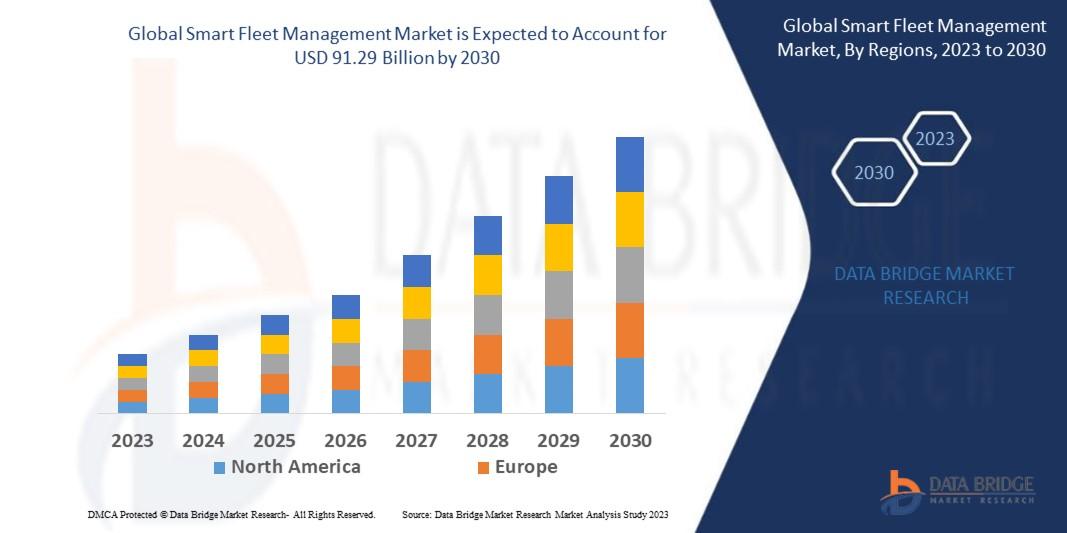Smart Fleet Management Market Expands with Increasing Adoption of Connected and IoT Technologies

The Smart Fleet Management Market is transforming the way businesses and organizations monitor, maintain, and optimize their vehicle fleets. With rapid advancements in telematics, IoT, artificial intelligence (AI), and data analytics, fleet managers now have access to real-time insights that enhance efficiency, reduce operational costs, and improve driver safety.
As global logistics, transportation, and mobility solutions become increasingly complex, smart fleet management systems are emerging as a critical enabler of digital transformation. This article provides an in-depth analysis of market trends, growth drivers, challenges, opportunities, and competitive dynamics shaping the global smart fleet management industry.
Market Overview
The global smart fleet management market has experienced significant growth in recent years, fueled by increasing adoption of connected vehicles, stringent regulatory requirements, and rising demand for operational efficiency.
-
Market Size (2025): Estimated at USD XX billion
-
Projected Growth: CAGR of XX% from 2025 to 2032
-
Key Regions: North America, Europe, Asia-Pacific, Latin America, Middle East & Africa
Smart fleet management encompasses a wide range of solutions, including:
-
Telematics – GPS tracking, route optimization, vehicle diagnostics
-
ADAS (Advanced Driver Assistance Systems) – collision warning, lane departure alerts, adaptive cruise control
-
Fleet Analytics – predictive maintenance, fuel management, performance tracking
-
Remote Diagnostics – real-time vehicle health monitoring
-
Driver Management – behavior monitoring, safety compliance, fatigue detection
Get a full overview of market dynamics, forecasts, and trends. Download the complete Smart Fleet Management Market report:
https://www.databridgemarketresearch.com/reports/global-smart-fleet-management-market
Key Market Drivers
1. Growing Adoption of IoT and Telematics
The integration of IoT devices and telematics into fleet management systems allows businesses to collect and analyze data in real time. This enables route optimization, predictive maintenance, and fuel efficiency improvements, reducing both costs and downtime.
2. Increasing Demand for Safety and Compliance
With road safety regulations tightening worldwide, fleet operators are investing in smart driver assistance and monitoring systems. Solutions such as driver fatigue detection, lane assist, and speed monitoring ensure compliance and improve safety records.
3. Rising Fuel Costs and Sustainability Goals
Fuel is one of the largest expenses in fleet operations. Smart fleet management solutions help optimize fuel consumption while supporting green fleet initiatives by monitoring emissions and integrating with electric vehicle (EV) fleets.
4. Expansion of E-Commerce and Logistics
The booming e-commerce sector has driven demand for efficient last-mile delivery and logistics operations. Smart fleet technologies provide logistics companies with a competitive edge through real-time visibility, route planning, and timely deliveries.
Market Challenges
While the growth potential is strong, several challenges may impact the market:
-
High Implementation Costs: Advanced fleet management systems require significant investment, which may deter small and medium-sized enterprises (SMEs).
-
Data Privacy & Cybersecurity Risks: Increased connectivity raises concerns around data breaches, hacking, and compliance with privacy regulations.
-
Integration Issues: Combining new technologies with legacy systems can be complex and time-consuming.
-
Driver Acceptance: Adoption may face resistance from drivers due to constant monitoring and perceived privacy concerns.
Opportunities in the Smart Fleet Management Market
1. Electrification of Fleets
The shift towards electric vehicles (EVs) presents a major opportunity. Smart fleet management platforms can support EV adoption by monitoring battery performance, charging schedules, and energy optimization.
2. AI-Powered Predictive Analytics
Artificial Intelligence (AI) and Machine Learning (ML) enhance predictive analytics, enabling proactive vehicle maintenance and reducing unexpected breakdowns.
3. Autonomous Fleet Integration
As autonomous driving technology advances, autonomous fleets will require smart management systems for coordination, monitoring, and safety compliance.
4. Cloud-Based Solutions
The rise of cloud-based fleet management software enables cost-effective deployment, scalability, and real-time access to data across geographies.
Segment Analysis
By Mode of Transport
-
Roadways: Dominant segment due to high adoption in commercial vehicles, trucking, and last-mile delivery.
-
Railways: Growing demand for freight monitoring and asset tracking.
-
Marine: Smart fleet adoption in cargo ships and maritime logistics.
-
Airways: Increasing use in aviation ground fleets and cargo carriers.
By Solution
-
Tracking and Telematics
-
Driver Information & Management
-
ADAS & Safety Systems
-
Fuel & Vehicle Diagnostics
By Deployment
-
On-Premise Solutions
-
Cloud-Based Solutions (fastest-growing due to flexibility and lower upfront costs)
Regional Insights
North America
-
Mature market with strong adoption of telematics and ADAS.
-
High regulatory pressure for emissions control and safety compliance.
Europe
-
Growing emphasis on sustainability and electrification of fleets.
-
Strong logistics infrastructure supporting adoption.
Asia-Pacific
-
Fastest-growing region due to rapid urbanization, e-commerce growth, and government support for digital transport systems.
-
Countries such as China, India, and Japan lead in telematics adoption.
Middle East & Africa
-
Rising demand in oil & gas logistics and commercial fleets.
-
Government investments in smart city initiatives.
Latin America
-
Increasing demand for fleet visibility in logistics and mining sectors.
-
Growth hindered slightly by economic constraints.
Competitive Landscape
Key players in the Smart Fleet Management Market are focusing on mergers, acquisitions, partnerships, and R&D to expand their product portfolios. Major companies include:
-
Robert Bosch GmbH
-
Denso Corporation
-
Siemens AG
-
Cisco Systems Inc.
-
IBM Corporation
-
Continental AG
-
TomTom International BV
-
Geotab Inc.
-
Trimble Inc.
-
Oracle Corporation
These companies are integrating AI, IoT, cloud computing, and cybersecurity into their solutions to gain a competitive edge.
Future Outlook
The future of the smart fleet management market lies in connected, autonomous, and sustainable mobility. With rapid digitalization, fleets will increasingly leverage AI-driven analytics, blockchain-based supply chains, and electrification to optimize performance.
By 2032, smart fleet management will likely become a standardized necessity for businesses across transportation, logistics, mining, construction, and energy industries. Companies that embrace these solutions early will benefit from enhanced efficiency, reduced operational costs, and improved customer satisfaction.
Conclusion
The Smart Fleet Management Market is on a high-growth trajectory, driven by the integration of advanced technologies, rising safety regulations, and the global push towards sustainable transport. Despite challenges such as high costs and data privacy concerns, opportunities in AI, electrification, and cloud-based solutions are expected to reshape the industry landscape.
Browse More Reports:
Global Water Treatment Chemicals Market
Global Ceramics Market
Global Gemstones Market
Global Smart Fleet Management Market
Global Tote Bags Market
Global Tuna Market
Global Cataracts Market
Global Kimchi Market
Global Party Supplies Market
Global Plant-Based Food Market
Global Processed Fruits Market
Global Wearable Devices Market
Global Commodity Plastics Market
Global Dehydrated Food Market
Global Hepatocellular Carcinoma Drugs Market
About Data Bridge Market Research:
An absolute way to forecast what the future holds is to comprehend the trend today!
Data Bridge Market Research set forth itself as an unconventional and neoteric market research and consulting firm with an unparalleled level of resilience and integrated approaches. We are determined to unearth the best market opportunities and foster efficient information for your business to thrive in the market. Data Bridge endeavors to provide appropriate solutions to the complex business challenges and initiates an effortless decision-making process. Data Bridge is an aftermath of sheer wisdom and experience which was formulated and framed in the year 2015 in Pune.
Contact Us:
Data Bridge Market Research
US: +1 614 591 3140
UK: +44 845 154 9652
APAC : +653 1251 975
Email:- corporatesales@databridgemarketresearch.com
- Giochi
- Religion
- Party
- Networking
- Music
- Literature
- Art
- Health
- Gardening
- Shopping
- Food
- Fitness
- Film
- Drinks
- Dance
- Crafts
- Causes
- Wellness
- Devotional Reflections
- Bible Study & Scripture Insights
- Prayer & Worship
- Christian Living
- Spiritual Growth & Discipleship
- Testimonies & Personal Journeys
- Christian Theology & Doctrine
- Church Calendar & Liturgical Seasons
- Christian Service & Mission
- Gardening
- Health
- Home
- Literature
- Networking
- Altre informazioni



